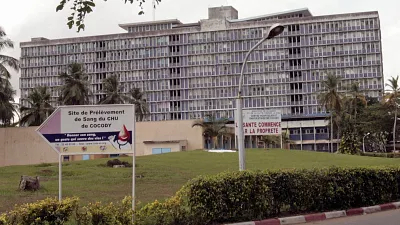Africa
Ivory Coast Dissolves Powerful Student Unions Following Deaths and Police Raid

The Ivorian government has dissolved major student unions after violent clashes led to deaths and a police raid on university campuses. The move aims to restore order amidst rising tensions within the student community.
The government of Ivory Coast has declared a prohibition on all student unions after two students lost their lives and 17 individuals were arrested in an altercation involving police and a student association linked to some highly influential figures in the nation.
The prohibition on Thursday, October 17th, followed a government raid on student housing managed by the student union FESCI. The government claims this group was linked to the fatalities.
According to the National Security Council, officers found large stockpiles of weapons and several “illegal businesses” within the student housing complex on the main campus of the University of Abidjan.
The arrests focused on the leadership of FESCI, including its general secretary Sié Kambou. He was taken into custody in relation to the killings, as indicated in a filing by chief prosecutor Koné Oumar.
The court filing stated that “Sié Kambou is always informed of any crime committed within the FESCI environment.”
In a statement released on Friday, October 18, FESCI described the decision as “a blatant breach of the constitutional rights to association, assembly, and peaceful demonstration,” while also rejecting any responsibility for the deaths.
The ban represented the peak of the government’s reaction to last month’s death of FESCI member Agui Deagoué. As stated by the public prosecutor’s office, Deagoué was Kambou’s chief competitor within the union and had been abducted while heading to a meeting with him.
FESCI was established in 1990 as a student association, but it quickly came into conflict with then-President Félix Houphouët-Boigny. He ordered the arrest of its leaders, accusing them of holding illegal meetings and demonstrations.
After Laurent Gbagbo, a rival of Houphouët-Boigny, assumed power in 2000, FESCI gained a privileged position. Authorities often ignored instances where its members attacked opposition supporters both on and off campus.
READ ALSO: Ivory Coast Cocoa Farmers Pivot to Rubber Farming
In 2011, Gbagbo was defeated in a presidential election but refused to concede, sparking violence where FESCI and its former leaders were reportedly involved in attacking opponents of the outgoing government.
Some notable former leaders of FESCI are Charles Blé Goudé and Guillaume Soro.
Charles Blé Goudé was tried for crimes against humanity at the International Criminal Court in The Hague, Netherlands, but he was acquitted in 2019.
Soro, once served as the president of the National Assembly and was a combatant in the war during the 2010s.
“FESCI used to be a progressive organization supporting students and pupils in Côte d’Ivoire,” said Julien-Geoffroy Kouao, an Abidjan-based political scientist, speaking with The Associated Press. “Regrettably, it has now strayed into becoming a group that employs violence as its means of action.”
Starting in the mid-2010s, FESCI gained control over a significant portion of student housing nationwide. Students report that they have been charging excessively high rates for accommodations that are frequently overcrowded or inadequately maintained.
However, some have come to the defense of the union, which represents 100,000 members constituting a third of Ivory Coast’s student population. A local politician named Désiré N’Guessan Kouamé remarked to the AP that FESCI as an organization should not be held accountable for certain members’ actions.
“Nowadays, some refer to it as a criminal organization. That’s fair; however, it’s important to acknowledge that every group or society may have its black sheep,” Kouamé remarked.
After the National Security Council made its decision, government workers started dismantling the group’s headquarters. However, due to FESCI’s involvement in managing student housing, some students doubted that this action would be sufficient to either shut down the organization or significantly diminish its influence.
